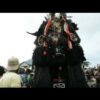Anambra News
THE BIAFRAN WAR REMEMBRANCE DAY


Nigeria was established as single colony by the United Kingdom in 1912. In 1960, it was officially declared as independent country, with the current borders and with a federal system, but it was still marked by a strong internal fragmentation.
Hundreds of groups had to live together in this territory within the externally established borders. Although there are more than 500 languages in the country and around 250 ethnic groups, the Nigerian society is divided into four main groups: the Hausa, the Fulani, the Yoruba and the Igbo people. In turn, the largest oil reserves are in the south of the country.
The Nigerian Civil War, also known as the Biafra War was a political-ethnic armed conflict caused by the attempted secession of the provinces of the south east of Nigeria, mostly populated by Igbo people.
In the mid-1960s economic and political instability and ethnic friction characterized Nigerian public life. In the mostly Hausa north, resentment against the more prosperous, educated Igbo minority erupted into violence. In September 1966, some 10,000 to 30,000 Igbo people were massacred in the Northern region, and perhaps 1,000,000 fled as refugees to the Igbo-dominated east. Non-Igbos were then expelled from the Eastern Region.


The war lasted two and a half years, and included the support of powers and superpowers to the two warring sides, with arms shipping from France, South Africa and Portugal to the rebels of the south, and support of the USSR and Great Britain to the federal government. Most African governments also supported the latter.




Peacemaking attempts by the Organization of African Unity (now the African Union), the pope, and others were ineffective, and Biafra began gaining recognition from African states (Cote D’Ivoire, Gabon, Tanzania, and Zambia). France provided weapons to Biafra, while the U.K. and the Soviet Union sent arms to the federal government. Biafra also received aid from international organizations for its population, which was suffering from starvation.
Although Nigeria won the armed struggle, the conflict weakened the civil government and a string of military coups followed: two in 1966 and in 1975, and then successively in 1983, 1985, 1993 and 1996, until, in 1999, democracy was finally established.
The thirty-month-long war led to the death of over one million ethnic Igbos and other Easterners. Described as the first black-on-black genocide in postcolonial Africa, the war had a terrible impact on the Igbo people with its massive civilian death toll.
It was the most reported conflict in contemporary African literature until the recent genocide in Rwanda. Much has been written about the Nigeria-Biafra War, and most of what has been written from within Nigeria is dominated by the accounts of the major actors and generals who conducted the war. Little, however, has been done on the genocidal aspect of the war against the Biafra side.
Despite the evidence that there were meticulously planned and implemented political project of exterminating the Igbo ethnic group in Northern Nigeria before the war and in other parts of Nigeria during the war, the genocide has been mischaracterized as a civil war. In what can be called “an invisible genocide,” the Igbo genocide was masked by the attempts by both federal Nigeria and major western nations to down play the evidence of the genocide perpetrated against the Igbo ethnic group as well as its deeper roots in the pre-civil war period. In addition, little empirically grounded work has been done.
The Igbos were confronted with the challenges of beginning life afresh from scratch with almost nothing. Since then, they have allegedly been marginalized on a continuous basis by the Nigerian government. This notwithstanding the people with their communal spirit, which saw them through the civil war, have continued to cement their survival resolve in the post-war era.
During the civil war, the Igbo people’s properties were liquidated and destroyed. After Biafra’s surrender, the Nigerian government delegitimized all of Biafra’s currency and gave all of its former citizens 20 pounds in exchange for any sum of Biafran pounds.
The Igbo faced devastating consequences, particularly economically as the Biafran currency that people had accumulated became worthless.
Many Igbo still feel sidelined in Nigerian politics, as since the civil war no-one from the ethnic group has become president.
The call for the development of Igboland is especially significant considering the lasting effects of the Nigerian Civil War. As a legacy of the conflict, the Igbo people continue to possess significantly smaller amounts of national resources, particularly including oil. The bulk of Nigeria’s resources are owned by Yoruba and Hausa individuals. Additionally, Igbo men and women continue to experience anti-Igbo discriminatory attitudes from members of other ethnic groups that affects the success of their businesses.
May 30th has been annually set aside for the people of the south-east as the Biafra Remembrance Day celebration to honor all those who died during the war for the freedom and sovereignty of Biafra.



























